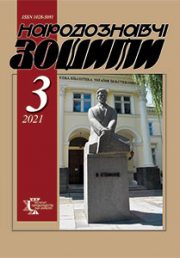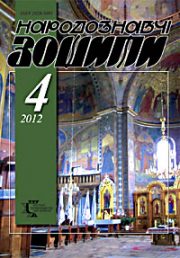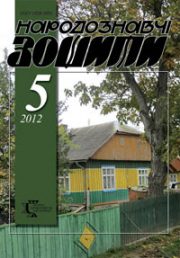The Ethnology Notebooks. 2022. № 6 (168), 1291—1299
UDK 930.2:[398.3/.4:631.55](477.82)
DOI https://doi.org/10.15407/nz2022.06.1291
TSYPYSHEV Serhii
- ORCID ID: https://orcid.org/0000-0001-5924-8930
- Ph. D., Deputy Director of Research,
- Museum of Folk Architecture and Rural Life in Lviv
- named after Klymentii Sheptytskyi,
- 1, Chernecha Hora str., 79014, Lviv, Ukraine,
- Contacts: e-mail: SerhiyTsypyshev@gmail.com
Abstract. The actuality of the issues of this publication is due to the lack of work generalizing for the Right Bank of Polissia, tangential to the declared topic, as well as the interest of the scientific society and the general public in the disappearing phenomena of the spiritual culture of the Polissia people. The purpose of the article is to comprehensively investigate the phenomenon of harvest magic of the Right Bank of Polissia. The object of the study is beliefs related to magical actions aimed at causing harm, the obligatory attribute of which are the so-called twists, and the subject is general Polish features, as well as regional and local features of such beliefs. The methodological basis was the methods of field ethnological research and the works of ethnologists available in the literature, which directly or indirectly relate to the announced topic.
The study, based on its own field materials, explores the phenomenon of the modern malevolent agrarian magic. Thus, the presence of relict archival elements in beliefs related to harvest magic in the territories of the Right Bank of Polissia is considered.
The basis of the study consists of the research and analysis of the use of so-called zakrutka as magical act, which is intended to harm certain persons, their families or property. The tangled ear itself acts as the central element of the rites, the main attribute that creates and is used by the witches to fix evil on those on whom their charms are directed. At the same time, the zakrutka is considered as one of the possible variants of the ritual sheaf, that was made at the beginning or end of the harvest, which twist, however, is used in such a way as to dishonor the deceased ancestors.
Both the figure of the bearer of magical knowledge and the numerous ways of forming and producing the zakrutka are analyzed. Popular ideas that are common to this day, related both to the magician himself and to the magical attribute that he uses, are given.
The mechanism of action of the zakrutka is also described and analyzed, as well as a complex of protective and neutralizing actions. Emphasis is placed on the frequent use of the powerful cleansing effect of fire and running water in acts of malicious enchantment level. The text of the protective verbal formula is represented, which allegedly neutralized the negative effect caused by the actions of the witches. In addition, examples of other malicious agricultural magic are given, which are created without the use of the zakrutka.
Keywords: zakrutka, harvest, witch, witcher, belief, malicious magic, whisper, sorcerer.
Received 4.11.2022
REFERENCES
- Dovzhenok, V.Y. (1961). Agriculture of ancient Rus. Kyiv: Pu blications of the Academy of Sciences of the Ukrainian SRU [in Ukrainian].
- Kuzyshin, E.E., Mandybura, M.D., & Molchanova, L.A. (1988). Polesie Material culture. Kiev: Naukova dumka [in Russian].
- Moisiienko, V. (1996). Polish orders. Drevlyany: A collection of articles and materials on the history and culture of the Polissky region. Lviv: Institute of Folklore of the National Academy of Sciences of Ukraine (Issue 1, pp. 121—166).
- Rybakov, B.A. (1986). The paganism of the ancient Slavs. Moscow: Nauka [in Russian].
- AA DNTsZKSTK. F. Sarny-(VII-VIII)-2008. Od. zb. S. Tsypyshev, AF-K8/17 [in Ukrainian].
- AA DNTsZKSTK. F. Sarny-(VII-VIII)-2008. Od. zb. S. Tsypyshev, AF-K7/16 [in Ukrainian].
- AA DNTsZKSTK. F. Sarny-(VII-VIII)-2008. Od. zb. S. Tsypyshev, AF-K8/28 [in Ukrainian].
- AA DNTsZKSTK. F. Volodymyrets-(VII-VIII)-2009. Od. zb. S. Tsypyshev, AF-K6/9 [in Ukrainian].
- AA DNTsZKSTK. F. Volodymyrets-(VII-VIII)-2009. Od. zb. S. Tsypyshev, AF-K2/24 [in Ukrainian].
- AA DNTsZKSTK. F. Sarny-(VII-VIII)-2008. Od. zb. S. Tsypyshev, AF-K6/24 [in Ukrainian].
- AA DNTsZKSTK. F. Sarny-(VII-VIII)-2008. Od. zb. S. Tsypyshev, AF-K10/34 [in Ukrainian].
- AA DNTsZKSTK. F. Volodymyrets-(VII-VIII)-2009. Od. zb. S. Tsypyshev, AF-K2/5 [in Ukrainian].
- AA DNTsZKSTK. F. Volodymyrets-(VII-VIII)-2009. Od. zb. S. Tsypyshev, AF-K3/19 [in Ukrainian].
- AA DNTsZKSTK. F. Volodymyrets-(VII-VIII)-2009. Od. zb. S. Tsypyshev, AF-K4/3 [in Ukrainian].
- AA DNTsZKSTK. F. Sarny-(VII-VIII)-2008. Od. zb. S. Tsypyshev, AF-K3/30 [in Ukrainian].
- AA DNTsZKSTK. F. Volodymyrets-(VII-VIII)-2009. Od. zb. S. Tsypyshev, AF-K5/3 [in Ukrainian].
- Serzhputouskі, A.K. (2009). Mermaid Sunday. Caprices and superstitions of Belarusians-Paleshukov. Minsk: Higher School, 2009. 478 p. [in Belarussian].
- Shkarban, A. Materials on traditional medicine of Zhytomyr Polissia. Polissia of Ukraine: materials of historical and ethnographic research. Lviv: Institute of Ethnology of the National Academy of Sciences of Ukraine, 1999. Issue 2 (Ovruchchyna. 1995). P. 211—224 [in Ukrainian].
- Vynogradova, L.I., & Tolstaya, S.M. The hall Slavic antiquities: an ethnolinguistic dictionary. Moscow: International Relations, 1999 (Vol. 2, pp. 262—263) [in Russian].
- Vinogradova, L.N., & Levkievskaya, E.E. Folk demonology of Polesia. Moscow: Languages of Slavic Cultures, 2010. (Vol. 1). 648 p. [in Russian].
- Vovk, Hv. Studies in Ukrainian ethnography and anthropology. Kyiv: ART, 1995. 336 p. [in Ukrainian].
- Federowski, M. Belarusian people in Lithuanian Ruthenia. Krakow: Published by the Academy of Arts and Sciences, 1897 (Vol. 1). 465 p. [in Polish].
- Baranowski, B. In the circle of ghouls and werewolves. Lodz: Edition of Lodz, 1981. 328 p. [in Polish].
- AA DNCZKSTK. F. Sarny-(VII-VIII)-2008. Od. zb. S. Tsypyshev, AF K12/21 [in Ukrainian].
- AA DNCZKSTK. F. Sarny-(VII-VIII)-2008. Od. zb. S. Tsypyshev, AF K12/8 [in Ukrainian].
- Zelenin, D.K. Eastern Slavic ethnography. Moscow: Nauka, 1991. 507 p. [in Russian].
- AA DNCZKSTK. F. Sarny-(VII-VIII)-2008. Od. zb. S. Tsypyshev, AF K5/26 [in Ukrainian].
- Shein, P.V. Materials for studying the life and language of the Ruthenian population of the North-West Region. St. Petersburg: Typography of the Imperial Academy of Sciences, 1893 (Vol. 2). 715 p. [in Russian].
- Pietkiewicz, Th. The spiritual culture of Polesie Rzeczyckie. Warsaw: Warsaw Scientific Society, 1938. 459 p. [in Polish].
- Kutelmah, K. (2006). Polish-Carpathian parallels in the all-Ukrainian calendar-ritual sphere. Ethnological notebooks, 3—4, 328—337 [in Ukrainian].
- AA DNCZKSTK. F. Lyubeshiv-(VII-VIII)-2015. Od. zb. C. Tsypyshev, AF D6 10 [in Ukrainian].
- AA DNCZKSTK. F. Volodarka-(VI)-2012. Od. zb. C. Tsypyshev, AF D5 11 [in Ukrainian].
- MNAiP archive in Lviv. Zv 105, 2010 (Tsypyshev S.I. Report on a business trip to Volovetskyi and Mizhhirskyi districts of Zakarpattia region). 12 sheet [in Ukrainian].
- AA DNCZKSTK. F. Volodymyrets-(VII-VIII)-2009. Od. zb. S. Tsypyshev, AF K3/7 [in Ukrainian].
- AA DNCZKSTK. F. Sarny-(VII-VIII)-2008. Od. zb. S. Tsypyshev, AF K9/13 [in Ukrainian].
- AA DNCZKSTK. F. Volodymyrets-(VII-VIII)-2009. Od. zb. S. Tsypyshev, AF K3/1 [in Ukrainian].
- AA DNCZKSTK. F. Sarny-(VII-VIII)-2008. Od. zb. S. Tsypyshev, AF K9/36 [in Ukrainian].
- AA DNCZKSTK. F. Volodymyrets-(VII-VIII)-2009. Od. zb. S. Tsypyshev, AF K4/20 [in Ukrainian].
- AA DNCZKSTK. F. Sarny-(VII-VIII)-2008. Unit collection S. Tsypyshev, AF K4/8 [in Ukrainian].
- AA DNCZKSTK. F. Volodymyrets-(VII-VIII)-2009. Od. zb. S. Tsypyshev, AF K6/12 [in Ukrainian].
- AA DNCZKSTK. F. March-(VII-VIII)-2013. Od. zb. C. Tsypyshev, AF D10 14 [in Ukrainian].
- Parkhomenko, T. Calendar customs and rites of the Rivne region: Materials of field research. Rivne: Ed. Oleg Zen, 2008. 200 p. [in Ukrainian].
- Zaivoronok, V.V. Signs of Ukrainian ethnoculture: dictionary-reference. Kyiv: Dovira, 2006. 703 p. [in Ukrainian].
- AA DNCZKSTK. F. Sarny-(VII-VIII)-2008. Od. zb. S. Tsypyshev, AF K12/1 [in Ukrainian].
- AA DNCZKSTK. F. Annual-(VII-VIII)-2010. Od. zb. S. Tsypyshev, AF K4/3 [in Ukrainian].
- AA DNCZKSTK. F. Sarny-(VII-VIII)-2008. Od. zb. S. Tsypyshev, AF K8/8 [in Ukrainian].
- AA DNCZKSTK. F. Volodymyrets-(VII-VIII)-2009. Od. zb. S. Tsypyshev, AF K4/19 [in Ukrainian].
- AA DNCZKSTK. F. Kamin-Kashirskyi-(VII-VIII)-2012. Unit collection C. Tsypyshev, AF D9 11 [in Ukrainian].
- AA DNCZKSTK. F. Annual-(VII-VIII)-2010. Od. zb. S. Tsypyshev, AF K3/23 [in Ukrainian].
- AA DNCZKSTK. F. Kamin-Kashirskyi-(VII-VIII)-2012. Od. zb. C. Tsypyshev, AF D8 9 [in Ukrainian].
- AA DNCZKSTK. F. Lyubeshiv-(VII-VIII)-2015. Od. zb. C. Tsypyshev, AF D5 11 [in Ukrainian].
- AA DNCZKSTK. F. Sarny-(VII-VIII)-2008. Od. zb. S. Tsypyshev, AF K10/13 [in Ukrainian].
- AA DNCZKSTK. F. Annual-(VII-VIII)-2010. Od. zb. S. Tsypyshev, AF K6/26 [in Ukrainian].
- AA DNCZKSTK. F. Volodarka-(VI)-2012. Od. zb. C. Tsypyshev, AF D2 9 [in Ukrainian].
- AA DNCZKSTK. F. March-(VII-VIII)-2013. Od. zb. C. Tsypyshev, AF D13 11 [in Ukrainian].







